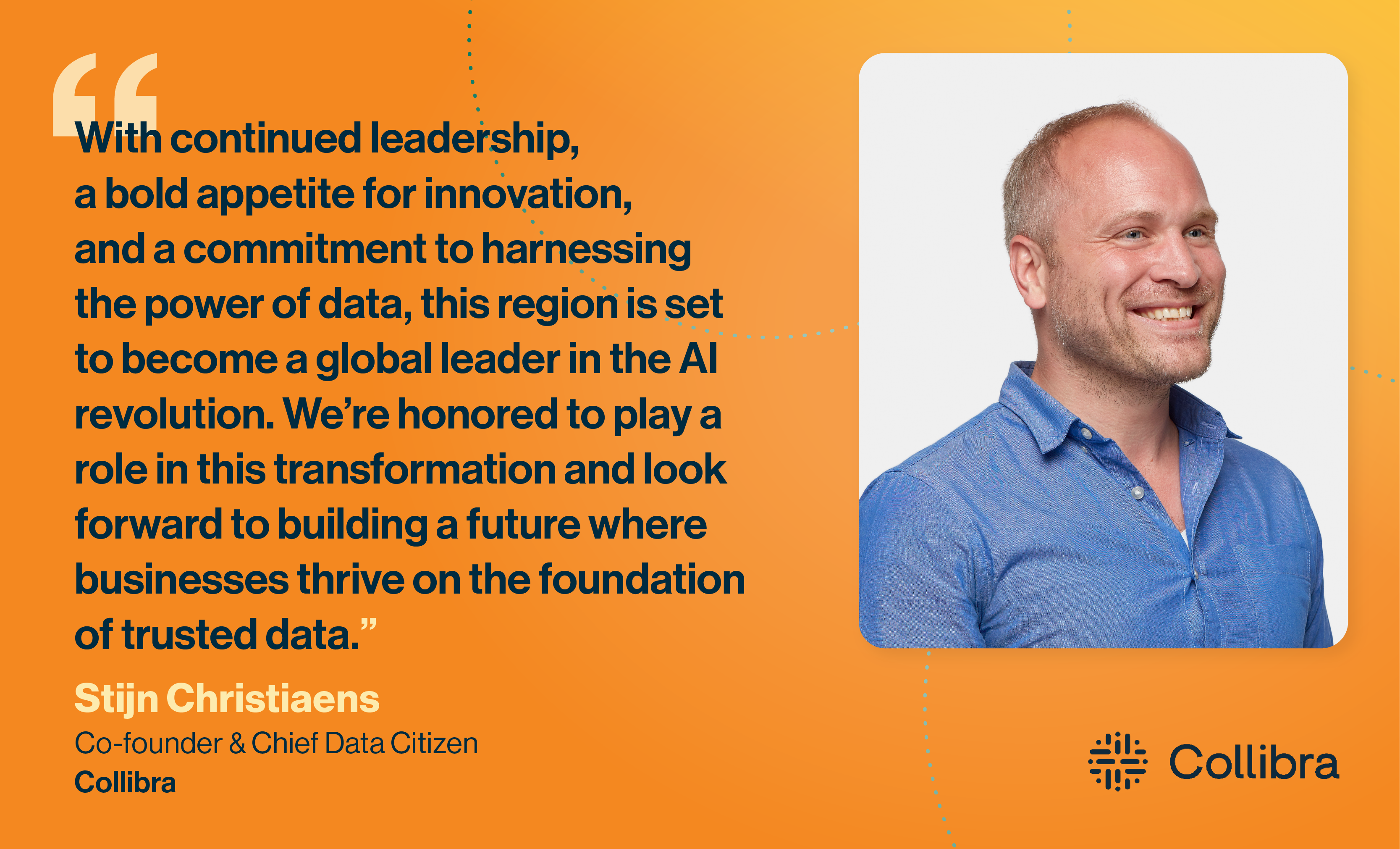The more things change, the more they stay the same. For data-driven organizations, data has always been a strategic asset. In the era of ‘big data,’ for example, a thousand Hadoop engineers couldn’t necessarily prevent poor data quality from compromising the integrity of a Hadoop cluster.
In today’s era of AI, data and AI leaders face a similar challenge: AI applications rely on massive amounts of data — and, now more than ever before, data governance is business-critical.
According to an IDC report from February 2024, we are rapidly moving into an era of “AI everywhere.” In fact, 87% of organizations say generative AI will have an impact on their business.1 But by 2027, 60% will fail to realize the value of their AI use cases due to incohesive data governance frameworks.2
The truth is that AI governance is an extension of data governance, it does not replace it. Both need to be implemented in order for enterprises to employ successful AI initiatives.
Learn more about Collibra AI Governance.
87% of organizations say generative AI will have an impact on their business. But by 2027, 60% will fail to realize the value of their AI use cases due to not cohesive data governance frameworks.
The twin challenges of AI regulations and data volume
Today’s AI leaders face many challenges, especially those related to:
- Navigating the regulatory environment
- Managing massive volumes of data
Regulations. An increasingly complex landscape of regulations govern the responsible use of AI technologies, including the EU’s Artificial Intelligence Act and, in the US, state-sponsored regulations enacted in Colorado and in the works in California. Such regulations will require businesses that deploy “high-risk” AI systems to submit impact assessments and protective measures to prevent algorithmic discrimination.
Data volume. By 2025, it’s estimated that 181 zettabytes of data will be created every day.3 But this overwhelming influx of data means that it’s crucial for organizations to develop robust data management and governance strategies.
To mitigate these twin challenges, data leaders must leverage governance best practices as an essential strategic pillar. From addressing compliance requirements to managing data quality, data hygiene is key to deploying AI products. Indeed, access to AI-ready data remains one of the most significant hurdles in implementing AI solutions.
As a result, your organization’s journey toward realizing the full benefits of AI must start with establishing trust — both in your AI systems themselves and in the data that powers them.
So what is data governance and how is it related to AI governance?
Learn more about Collibra Data Governance.
“Realizing the full benefits of AI must start with establishing trust — both in your AI systems themselves and in the data that powers them.”
Why data governance and AI governance are essential
Data governance involves defining policies, processes and roles for handling data, enhancing decision-making and ensuring regulatory compliance by managing data assets and enforcing data access. Effective data governance improves data transparency, maximizes data usage and reduces risks. It is about creating a structured environment where data is accessible, reliable and secure.
AI governance, a relatively new discipline, follows a similar path but focuses specifically on AI applications. It involves defining policies, roles and responsibilities for AI use, ensuring decision-making processes align with ethical standards, and securing compliance with relevant regulations.
Both frameworks overlap significantly in ensuring that data is accurate, accessible and usable, which in turn enables more accurate and trusted AI outputs.
From healthcare innovations to next-generation social platforms, AI and data are the driving forces behind modern technological progress. However, with great power comes great responsibility. AI poses real risks to privacy, fairness and transparency, necessitating robust governance frameworks to manage these challenges responsibly. AI can introduce biases in decision-making processes, such as in loan applications or predictive policing, which can have profound negative impacts on individuals and communities.
Ensuring AI systems are governed properly is essential to mitigate these risks and to harness the benefits of AI effectively.
Laying a governance groundwork for AI readiness
One thing is clear: AI cannot exist without data, and governed AI cannot exist without governed data.
Data governance serves as the blueprint to ensure your organization’s data is prepared for AI usage. Without proper oversight, poor-quality data can lead to poorly trained AI models, resulting in improper outputs, bias, hallucinations and other issues.
Implementing a strong data governance framework ensures that your data is of the highest quality, accurate, and reliable, which in turn leads to more trusted AI outputs, increased transparency and better model accuracy. This foundation is critical for any organization looking to leverage AI technologies effectively.
“A strong data governance framework is critical for any organization looking to leverage AI technologies effectively.”
Integrate AI and data governance with Collibra
Collibra offers a comprehensive solution that integrates both AI and data governance into a single platform.
Our platform supports the entire governance lifecycle, from defining and managing data policies to implementing AI governance frameworks. By bringing these elements together, Collibra helps organizations to streamline processes, reduce risk and maximize the value of their data and AI initiatives.
As AI continues to evolve and permeate various sectors, the importance of governance frameworks will only grow. Organizations — as well as data and AI leaders — are eager to advance their AI journey. But laying the proper groundwork is an essential step before diving right into AI. Embrace the future of AI with a strong governance foundation and let Collibra guide you on this transformative journey.
Discover how Collibra can help your organization unlock the full potential of AI technologies while mitigating risks and ensuring ethical practices.
***
1 IDC, “The Critical Role of AI Governance for AI Success,” https://www.collibra.com/resources/the-critical-role-of-ai-governance-for-ai-success/k0NzIzNz
2 Gartner, “Adopt a Data Governance Approach That Enables Business Outcomes,” https://www.gartner.com/en/data-analytics/topics/data-governance.
3 Statista, “Volume of data/information created, captured, copied, and consumed worldwide from 2010 to 2020, with forecasts from 2021 to 2025,” https://www.statista.com/statistics/871513/worldwide-data-created/




